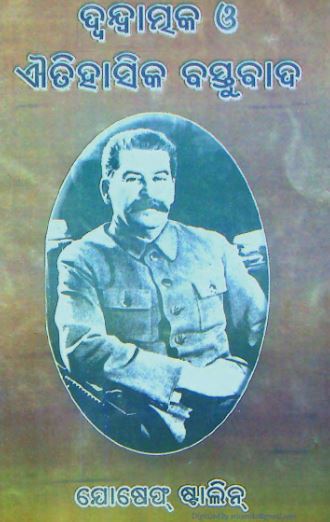Joseph Stalin’s seminal essays in “Dwandwatmaka O Aitihasika Bastubada” provide a comprehensive exploration of the dialectical interplay between opposing forces in society, the historical dynamics of class struggle, and the materialist understanding of historical progress. Through his lucid exposition, Stalin elucidates the principles of Marxist philosophy and their practical application in shaping revolutionary movements and governance.
The translated work by Nilamai Sahu offers readers in Odia a rare opportunity to engage with the profound insights of Stalin’s writings on Marxism, socialism, and the philosophical underpinnings of the Soviet Union’s socio-political system. Sahu’s translation preserves the essence and spirit of Stalin’s original work, allowing Odia readers to delve into the complexities of dialectical materialism and historical analysis as espoused by one of the towering figures of 20th-century socialism.
In “Dwandwatmaka O Aitihasika Bastubada,” readers are invited to explore Stalin’s reflections on the fundamental contradictions of capitalism, the inevitability of class conflict, and the transformative potential of proletarian revolution in reshaping society along socialist lines. Stalin’s incisive analysis of historical materialism offers a lens through which readers can critically examine the socio-economic structures of their own time and place.
Through a series of rigorous and analytical essays, Stalin dismantles bourgeois ideologies, critiques the exploitation inherent in capitalist systems, and advocates for the primacy of collective ownership and workers’ control over the means of production. His writings in “Dwandwatmaka O Aitihasika Bastubada” serve as a rallying cry for social justice, economic equality, and the emancipation of the working class from the shackles of capitalist exploitation.
The translation of Stalin’s essays into Odia opens up new avenues for scholarly engagement with Marxist theory, socialist philosophy, and the enduring relevance of dialectical materialism in contemporary discourses on power, inequality, and social change. “Dwandwatmaka O Aitihasika Bastubada” stands as a testament to the enduring legacy of Marxist thought, inviting readers to explore the intellectual depth and revolutionary spirit of Stalin’s ideological contributions to the global struggle for a more just and equitable society.
In conclusion, “Dwandwatmaka O Aitihasika Bastubada” serves as a bridge between the theoretical insights of Marxist philosophy and the practical imperatives of socialist praxis, illuminating the path towards a more equitable and just world order. Through the translation of Stalin’s seminal works into Odia, Nilamai Sahu enables a wider readership to engage with the complexities of Marxist thought and to ponder the profound implications of dialectical materialism in understanding the past, present, and future of human society.
Books Info
| Books name | Dwandwatmaka O Aitihasika Bastubada |
| Editor | Joseph Stalin; Nilamai Sahu, Tr. |
| No Of pages | 46 |
| Publisher | Nabajanabadi Prakashaka |
| Publication | 2013 |
| Printed At | Basanti Press |
| Distributor | NA |

